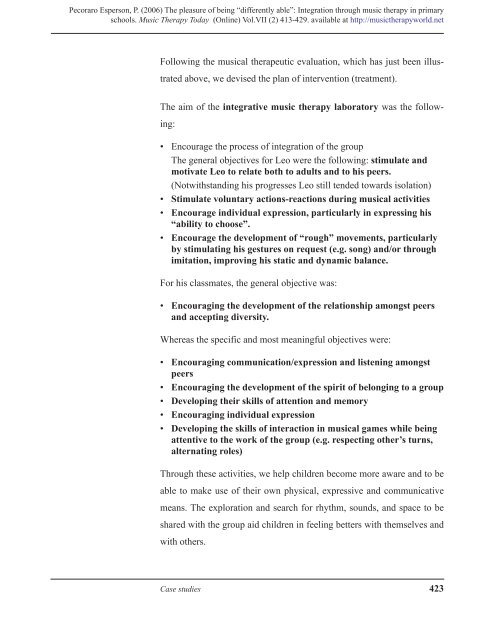Music Therapy Today - World Federation of Music Therapy
Music Therapy Today - World Federation of Music Therapy
Music Therapy Today - World Federation of Music Therapy
You also want an ePaper? Increase the reach of your titles
YUMPU automatically turns print PDFs into web optimized ePapers that Google loves.
Pecoraro Esperson, P. (2006) The pleasure <strong>of</strong> being “differently able”: Integration through music therapy in primary<br />
schools. <strong>Music</strong> <strong>Therapy</strong> <strong>Today</strong> (Online) Vol.VII (2) 413-429. available at http://musictherapyworld.net<br />
Following the musical therapeutic evaluation, which has just been illus-<br />
trated above, we devised the plan <strong>of</strong> intervention (treatment).<br />
The aim <strong>of</strong> the integrative music therapy laboratory was the follow-<br />
ing:<br />
• Encourage the process <strong>of</strong> integration <strong>of</strong> the group<br />
The general objectives for Leo were the following: stimulate and<br />
motivate Leo to relate both to adults and to his peers.<br />
(Notwithstanding his progresses Leo still tended towards isolation)<br />
• Stimulate voluntary actions-reactions during musical activities<br />
• Encourage individual expression, particularly in expressing his<br />
“ability to choose”.<br />
• Encourage the development <strong>of</strong> “rough” movements, particularly<br />
by stimulating his gestures on request (e.g. song) and/or through<br />
imitation, improving his static and dynamic balance.<br />
For his classmates, the general objective was:<br />
• Encouraging the development <strong>of</strong> the relationship amongst peers<br />
and accepting diversity.<br />
Whereas the specific and most meaningful objectives were:<br />
• Encouraging communication/expression and listening amongst<br />
peers<br />
• Encouraging the development <strong>of</strong> the spirit <strong>of</strong> belonging to a group<br />
• Developing their skills <strong>of</strong> attention and memory<br />
• Encouraging individual expression<br />
• Developing the skills <strong>of</strong> interaction in musical games while being<br />
attentive to the work <strong>of</strong> the group (e.g. respecting other’s turns,<br />
alternating roles)<br />
Through these activities, we help children become more aware and to be<br />
able to make use <strong>of</strong> their own physical, expressive and communicative<br />
means. The exploration and search for rhythm, sounds, and space to be<br />
shared with the group aid children in feeling betters with themselves and<br />
with others.<br />
Case studies 423

















